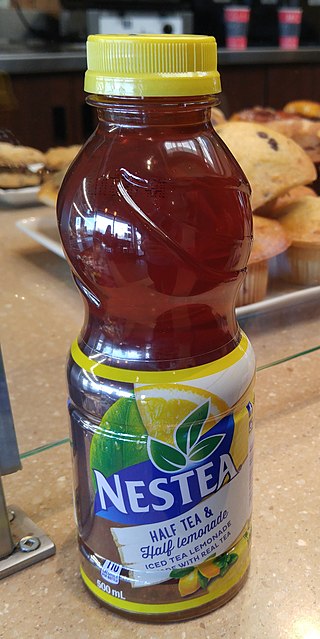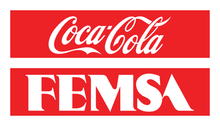
SABMiller plc was a South African multinational brewing and beverage company headquartered in Woking, England on the outskirts of London until 10 October 2016 when it was acquired by AB InBev. It was the world's second-largest brewer measured by revenues and was also a major bottler of Coca-Cola. Its brands included Foster's, Miller, and Pilsner Urquell. It operated in 80 countries worldwide and in 2009 sold around 21 billion litres of beverages. Since 10 October 2016, SABMiller is a business division of AB InBev, a Belgian multinational corporation with headquarters in Leuven.

The Coca-Cola Company is an American multinational corporation founded in 1892. It produces Coca-Cola. The drink industry company also manufactures, sells, and markets other non-alcoholic beverage concentrates and syrups, and alcoholic beverages. The company's stock is listed on the NYSE and is part of the DJIA and the S&P 500 and S&P 100 indexes.

Coca-Cola Amatil Limited (CCA) was an Australian bottler of non-alcoholic beverages that existed from 1904 to 2021, when it merged with Coca-Cola European Partners to form Coca-Cola Europacific Partners. It was one of the largest bottlers of non-alcoholic ready-to-drink beverages in the Asia-Pacific region and one of the world's five major Coca-Cola bottlers. CCA operated in six countries—Australia, New Zealand, Indonesia, Papua New Guinea, Fiji and Samoa. The company also bottled beer and coffee.
Coca-Cola Enterprises was a marketer, producer, and distributor of Coca-Cola products. It was formerly the anchor bottler for Western Europe and most of North America.

Nestea is a Swiss brand of iced tea and pop beverages owned by Nestlé, manufactured by The Coca-Cola Company and distributed by Nestlé's beverage department in the United States and by Beverage Partners Worldwide (BPW), a joint venture between The Coca-Cola Company and Nestlé, in the rest of the world. It competes with Unilever/PepsiCo's Lipton Iced Tea and Fuze Tea. Nestea provides a variety of tea products, including liquid and powdered tea concentrates, refrigeratable teas, and ready-to-drink bottles dispensed by vendor or vending machine. The beverage comes in several flavors, depending on the country.
Hit is a carbonated fruit-flavored soft drink brand owned by The Coca-Cola Company that is available in Venezuela, and is sold as the Venezuelan counterpart to Coca-Cola's existing Fanta brand.
GT Global is one of the largest companies in northeastern Mexico. It is located in Tampico, Tamaulipas. GT Global's main products are Finance, automobiles, plastics and tourism services.

Ciel is a brand of bottled water owned by The Coca-Cola Company which is bottled and sold in Mexico, Angola, and Morocco. As of 2015, it held a 19.4% share of the bottled water market in Mexico. bottled water brands owned by The Coca-Cola Company in multiple countries use the Ciel branding.

Ajegroup, commonly known as AJE, is a Peruvian multinational company dedicated to the manufacture, distribution and sale of alcoholic and non-alcoholic beverages. The company was founded by the Añaños-Jerí Family in 1988 in Ayacucho, Peru. It is known for its flagship products Kola Real and Big Cola.

Coca-Cola Blak was a coffee-flavored soft drink introduced by Coca-Cola in 2006 and discontinued in 2008. The mid-calorie drink was introduced first in France and subsequently in other markets, including Czech Republic, Slovakia, and Lithuania.
AdeS is a brand of two different beverage products owned and produced by The Coca-Cola Company. In Indonesia, it is a bottled water while in Latin America, it is a soy-based beverage. In Japan, the bottled water product is also known as I-Lohas. The name for the soy-based beverage product comes from the Spanish acronym, "Alimentos de Soja" which means food from seeds. The soy-based beverage product currently has a presence in Brazil, Mexico, Argentina, Uruguay, Paraguay, Bolivia, Chile and Colombia.
Yoli is a lime soda produced in Mexico. A regional drink, until recently it was only available in the state of Guerrero and surrounding areas.

In the United States, Mexican Coca-Cola, or Mexican Coke or, informally, "Mexicoke", refers to Coca-Cola produced in and imported from Mexico. The Mexican formula that is exported into the U.S. is sweetened with white sugar instead of the high-fructose corn syrup used in the American formula since the early 1980s. Some tasters have said that Mexican Coca-Cola tastes better, while other blind tasting tests reported no perceptible differences in flavor.
Coca-Cola Beverages Philippines, Inc. is a Philippine-based company engaged in the bottling and distribution of Coca-Cola products in the country. CCBPI is part of the Bottling Investment Group (BIG), The Coca-Cola Company (TCCC)-owned bottling operation intent on building a foundation for long-term success. BIG's operations are primarily focused on markets in Southeast Asia, India, and Southwest Asia, covering 14 countries with 39 plants and 16,500 employees, serving 1.8 billion consumers.

RFM Corporation is a publicly listed food and beverage company in the Philippines. RFM is a manufacturer of flour and flour-based products, milk, juice drinks, and ice cream. As of June 2013, RFM had an asset base of P12 billion and a total market capitalization of P17.1 billion.
Jugos del Valle (Del Valle Juices) is a Mexican producer of fruit juices and beverages. Founded in 1947, today Jugos del Valle is one of the leading food, juice and beverage companies in Mexico producing popular brands such as Del Valle, Florida 7, Frutsi, Bebere, among others, also acting as a bottler for some Coca-Cola drinks such as Powerade, Energy Brands and Gladiator Energy Drink. Operations range from the US, to Brazil, Venezuela, Puerto Rico, Chile, Argentina, Colombia, and most parts of Central America. Since 2007 is a wholly owned subsidiary of Coca-Cola FEMSA, the main Mexican bottler of Coca-Cola.
Coca-Cola Beverages Africa is a company that was formed in 2014 from the merger of SABMiller plc, The Coca-Cola Company and Gutsche Family Investments beverage bottling operations in Southern and East Africa.

Coca-Cola Europacific Partners plc (CCEP), formerly Coca-Cola European Partners (2016–2021) is a British-American company formed as a result of the combination of the three main bottling companies for The Coca-Cola Company in Western Europe: Coca-Cola Enterprises, Coca-Cola Iberian Partners, S.A. and Coca-Cola Erfrischungsgetränke AG, and one bottling company in Asia-Pacific: Coca-Cola Amatil. The multinational bottling company involved in the marketing, production, and distribution of Coca-Cola products and other drinks such as Capri-Sun, Monster and Relentless.
Fomento Económico Mexicano, S.A.B. de C.V., doing business as FEMSA, is a Mexican multinational beverage and retail company headquartered in Monterrey, Mexico. It operates the largest independent Coca-Cola bottling group in the world and the largest convenience store chain in Mexico. It is also a shareholder of Heineken N.V.
Estrella Azul is a Panamanian dairy products brand. The brand was once partly owned by American soda company Coca-Cola.










